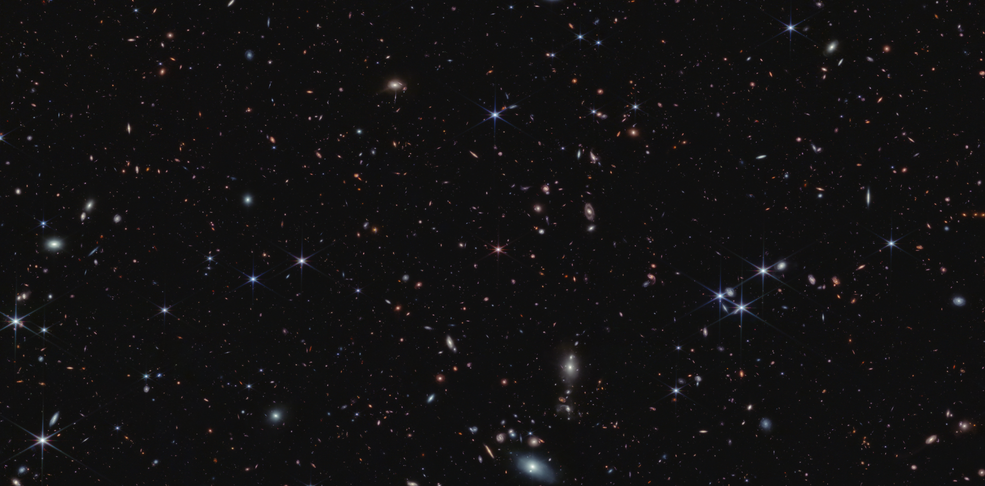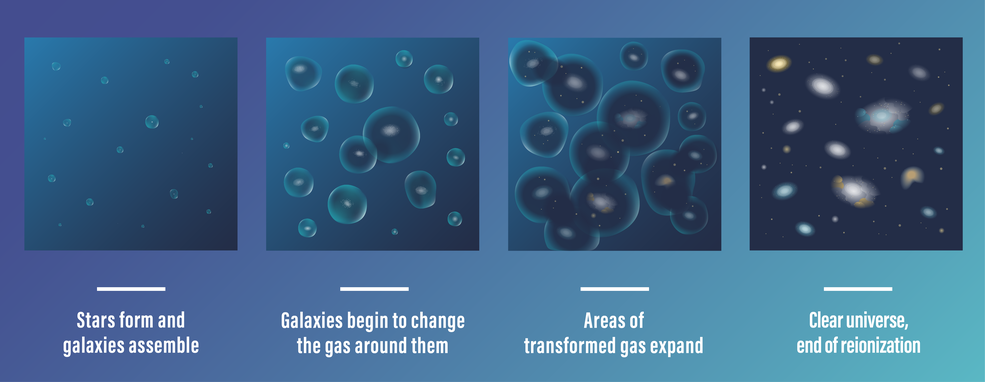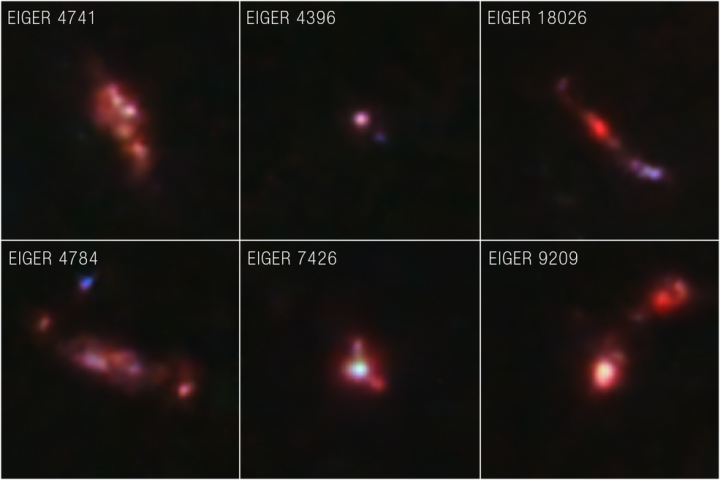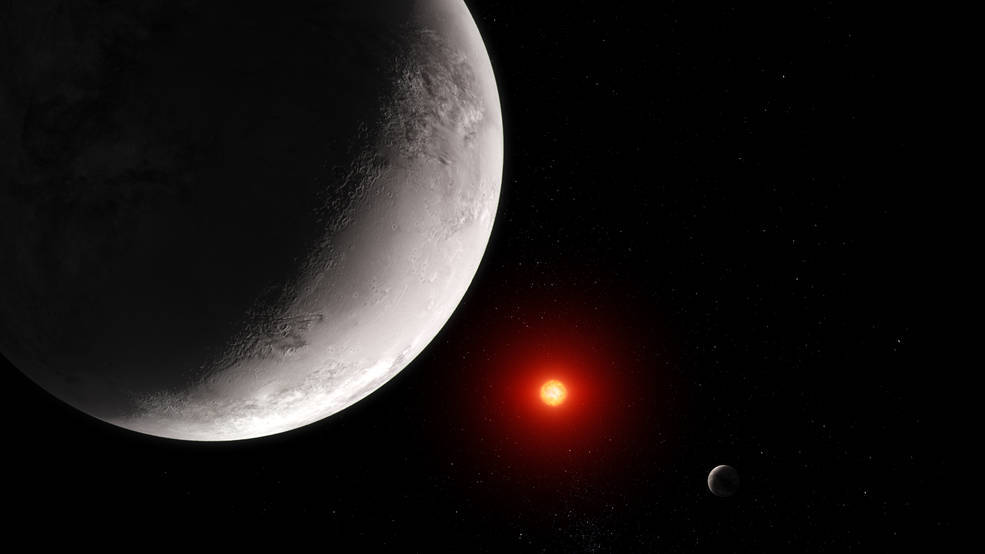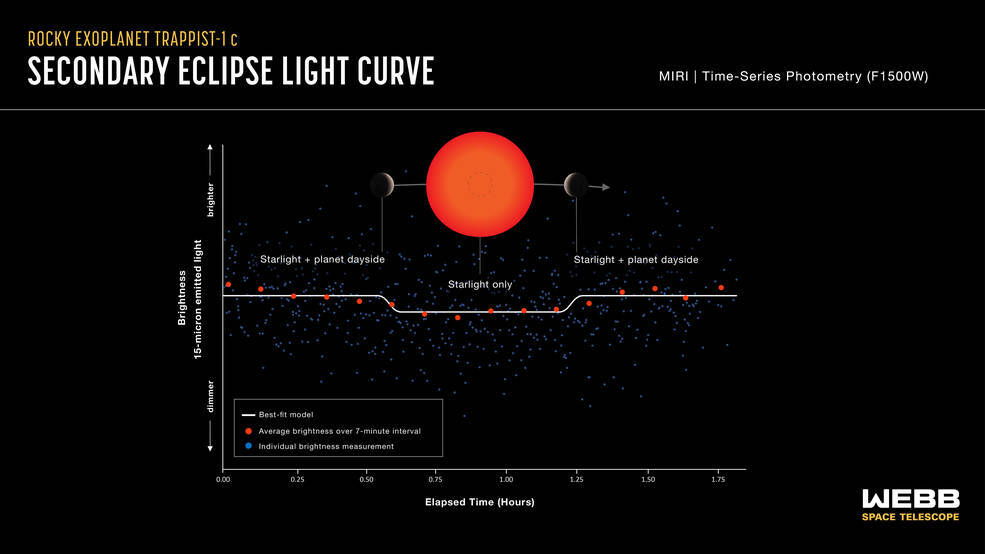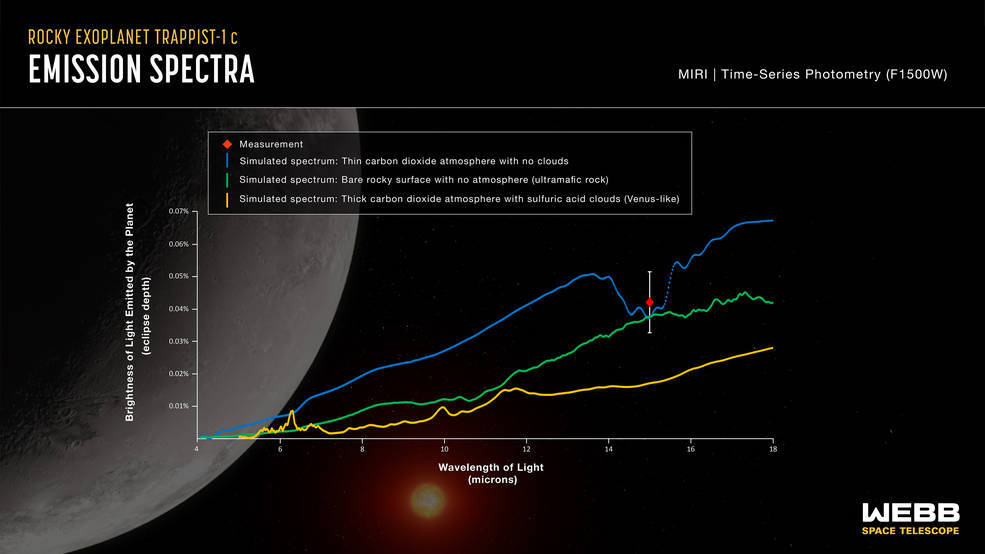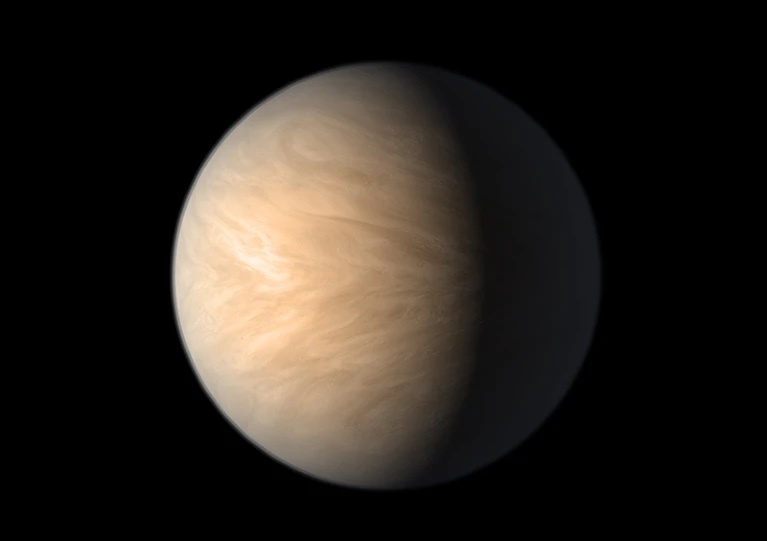Observations from the James Webb Space Telescope suggest that a second world in a seven-planet system lacks an atmosphere.
For the second time, the James Webb Space Telescope (JWST) has looked for and failed to find a thick atmosphere on an exoplanet in on one of the most exciting planetary systems known. Astronomers report1 today that there is probably no tantalizing atmosphere on the planet TRAPPIST-1 c, just as they reported months ago for its neighbour TRAPPIST-1 b.
There is still a chance that some of the five other planets in the TRAPPIST-1 system might have thick atmospheres containing geologically and biologically interesting compounds such as carbon dioxide, methane or oxygen. But the two planets studied so far seem to be without, or almost without, an atmosphere.
Because planets of this type are common around many stars, “that would definitely reduce the amount of planets which might be habitable”, says Sebastian Zieba, an exoplanet researcher at the Max Planck Institute for Astronomy in Heidelberg, Germany. He and his colleagues describe the finding in Nature.
System with star power
All of the seven TRAPPIST-1 planets, which orbit a star some 12 parsecs (40 light years) from Earth, have rocky surfaces and are roughly the size of Earth. Astronomers consider the system to be one of the best natural laboratories for studying how planets form, evolve and potentially become habitable. The planets are a key target for JWST, which launched in 2021 and is powerful enough to probe their atmospheres in greater detail than can other observatories such as the Hubble Space Telescope.
The planets’ host star is a dim cool star known as an M dwarf, which is the most common type of star in the Milky Way. It blasts out large amounts of ultraviolet radiation, which could erode any atmosphere on a nearby planet.
The system’s innermost planet, TRAPPIST-1 b, is blasted with four times the amount of radiation that Earth gets from the Sun, so it wasn’t too much of a surprise when JWST found that it had no substantial atmosphere2. But the next in line, TRAPPIST-1 c, orbits farther from its star, and it seemed possible that the cooler planet might have managed to hang on to more of an atmosphere.
Zieba’s team pointed JWST at the TRAPPIST-1 system four times during October and November, allowing the scientists to calculate that TRAPPIST-1 c’s surface temperature, on the side that faces its star, registers at around 107 °C — too hot to maintain a thick atmosphere that is rich in carbon dioxide.
Low-water mark
By comparing the observations with models of the planet’s possible chemistry, the scientists also concluded that TRAPPIST-1 c would have had very little water when it formed — less than ten Earth oceans’ worth of water. Together, the low amount of water at the planet’s birth and the lack of a thick carbon dioxide atmosphere today suggest that TRAPPIST-1 c never had many ingredients for habitability.
But there might still be hope for other planets in the system. In a paper3 posted on 8 June on the arXiv preprint server, Joshua Krissansen-Totton, a planetary scientist at the University of Washington in Seattle, reported that the TRAPPIST-1 planets e and f — the fourth and fifth farthest from the star — could still have thick atmospheres, because they sit far enough away from the star to avoid having all of their water blasted away, unlike planets b and c.
In other words, what scientists find on planets b and c might not say much about what the atmospheres of the outer planets could look like. “I think it makes sense to remain agnostic on the prospects for the outer planets retaining atmospheres,” Krissansen-Totton says.
Quelle: nature
----
Update: 22.06.2023
.
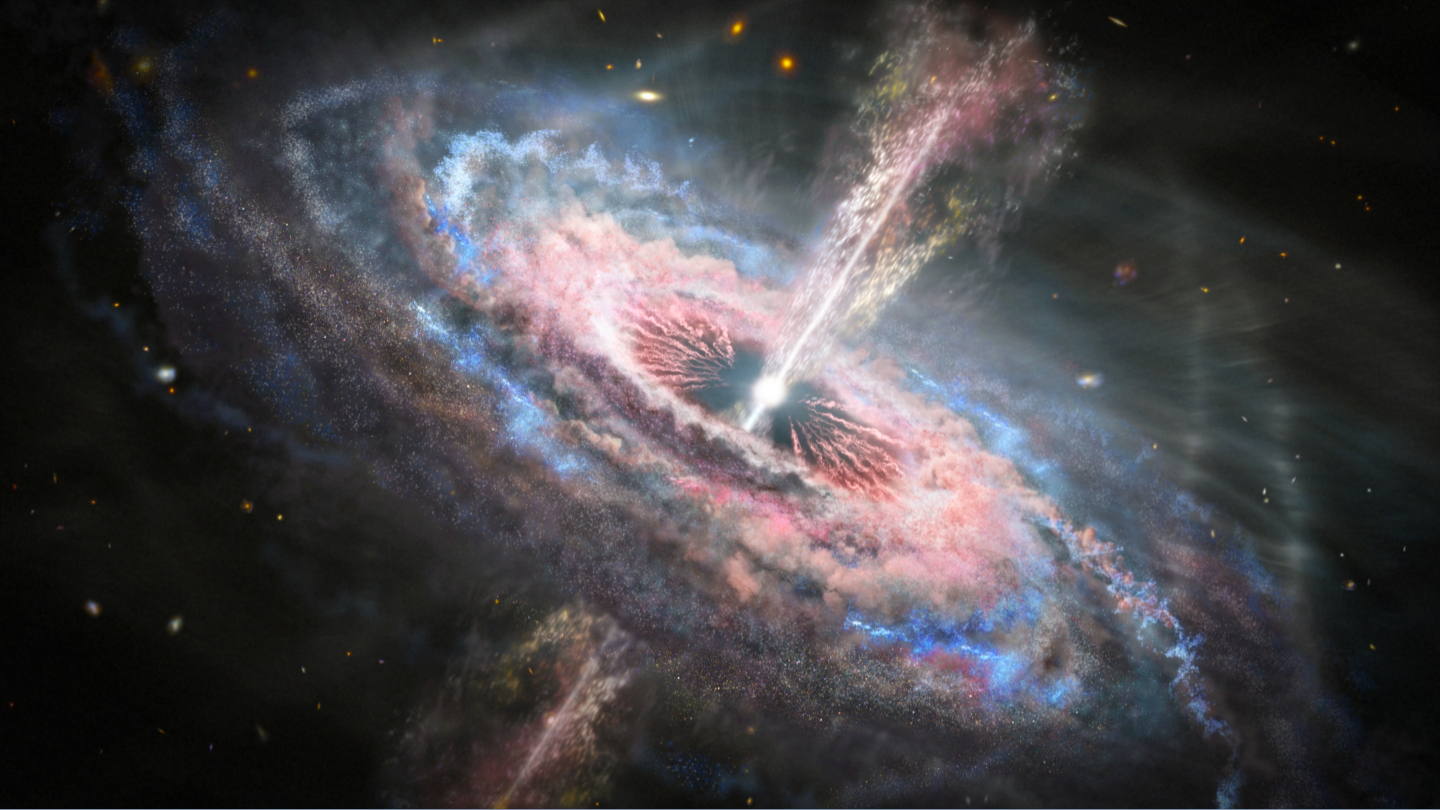
Some distant galaxies host quasars (one illustrated), supermassive black holes that eat so fast they create a bright glow that outshines all of their galaxies’ stars.
NASA, ESA AND J. OLMSTED/STSCI
CAMBRIDGE, MASS. — For the first time, astronomers have detected starlight from distant galaxies that host extremely bright supermassive black holes called quasars.
Data from the James Webb Space Telescope reveal that four of these galaxies are massive, compact and possibly disk-shaped, astronomers report June 12 at the JWST First Light meeting. Studying the galaxies could help solve the mystery of how black holes in the early universe grew so big so fast(SN: 1/18/21).
“Ever since the discovery of [distant] quasars, there have been studies trying to detect their host galaxies,” said MIT astrophysicist Minghao Yue. But until JWST’s sharp infrared eyes came along, it wasn’t possible. “This opens up brand new windows towards finally understanding luminous quasars and their host galaxies.”
Quasars are black holes that are feeding so furiously, the material they gobble heats to white-hot temperatures, shining brighter than the stars in the galaxy around them. They’re so bright and distant that each appears as a single, starlike point of light.
Two independent groups used that starlike quality to erase the black hole glow from images of their galaxies, like a sculptor coaxing a figure out of marble.
Yue and colleagues used JWST to observe six quasar-hosting galaxies. Around the same time, astrophysicist Xuheng Ding of the Kavli Institute for the Physics and Mathematics of the Universe in Tokyo and colleagues used JWST to look at another pair of quasars. The light from all the quasars was emitted more than 12.8 billion years ago, or less than a billion years after the Big Bang.
The teams used actual stars in the images to simulate the starlike shapes of the quasars. Then they subtracted the simulated quasar from the image of each whole galaxy, and voilà: Only starlight remained.
Ding’s team got a direct peek at both of their galaxies, while Yue’s team glimpsed two of their six. All the measured galaxies appear to be less than a tenth as wide as the Milky Way, measuring between 2,600 and 8,000 light-years across. The two galaxies that Yue and colleagues observed contain enough stars to make up between 10 billion and 100 billion times the mass of the sun, the researchers estimate. The pair that Ding and colleagues looked at weigh in at about 25 billion and 63 billion solar masses, the team reported at the meeting and in a study to appear in Nature.
Those masses are comparable to that of all the stars in the Milky Way, which in total add up to roughly 60 billion times the mass of the sun. That’s surprisingly massive for so early in the universe’s history.
What’s more, the galaxies seem to break a rule set by observations of galaxies in the nearby universe. Locally, galaxies tend to split their mass between stars and black holes in a predictable way: The more massive its central supermassive black hole, the more stars a galaxy has. These galaxies appear to pack more mass into their black hole than their amount of stars should allow.
“At least for these luminous quasars, they really are over-massive,” Yue said.
The mass calculations might prove to be overestimates, says astrophysicist Paul Shapiro of the University of Texas at Austin who was not involved in either study. Converting the light that JWST can see into stars rests on assumptions about how many stars of various masses a galaxy has. Modern galaxies have a lot more dim, lightweight stars than bright, hefty ones, so astronomers typically assume that the brightest stars they see are just the tip of the iceberg. But that might not have been the case 800 million years after the Big Bang, Shapiro says.
“You’re observing the tail and inferring the dog,” he says. “If there were a mass distribution that favors high-mass stars, you could be significantly overestimating the mass associated with the light.”
But “the fact that we can see it at all is very exciting,” says astronomer Madeline Marshall of the National Research Council Canada in Victoria. The fact that two groups are reporting starlight from quasar hosts independently is very convincing, she says.
“Pre-JWST, we could not detect host galaxies of [distant] quasars,” she said at the meeting. “Now, with only the first year of observations … we can actually detect some of these hosts for the first time.”
These first few quasar hosts are just the beginning, Ding says. JWST is scheduled to observe at least 10 more, some of which are even farther away. A larger sample will help astronomers figure out enduring cosmic riddles about how black holes and galaxies influence each other as they grow.
“We don’t know how black holes can be so big in the early universe,” Ding says. “You need to understand the environment of this monster, how it can collect so much matter to it. So knowing the conditions — the mass of the host galaxies, for example — at least then you can say how their local environment is.”
Quelle: ScienceNews
----
Update: 23.06.2023
.
Unveiling Jupiter’s upper atmosphere
A North East planetary astronomer has been granted rare access to the world’s largest deep-space telescope, providing him with a unique opportunity to discover more about the largest planet in our solar system – Jupiter.
Launched in December 2021, NASA’s James Webb Space Telescope (JWST) uses infrared radiation to look deep into space, meaning it can observe the first stars and even the formation of the first galaxies.
Now Professor Tom Stallard, of Northumbria University, has been awarded a highly sought after opportunity to use the JWST later this year, allowing him to further his research into Jupiter’s atmosphere.
This is only the second year scientists have been given the chance to request access to the telescope, and with fierce competition from across the world, Professor Stallard’s observation is the only one chosen this year which will focus on a planet within our solar system.
He and his co-investigator Dr Henrik Melin, of the University of Leicester, will use their time to examine Jupiter’s ionosphere – the planet’s upper atmosphere – and how it is impacted by the space environment above it, and Jupiter’s lower atmosphere below.
As Professor Stallard explains: “The ionosphere is a very interesting layer because it is buffeted by massive systems surrounding it – with energy pushed up from below and solar winds and volcanic activity from Jupiter’s moons affecting it from above.
“We have some existing images and data of the bright aurora at Jupiter’s poles, captured through ground-based observation from here on Earth, but data and images of the equatorial region are much harder to achieve.
“Although Jupiter appears very different to Earth there is actually much we can learn about our own planet by studying Jupiter. The processes going on are very similar, but Jupiter’s magnetic field is much stronger, and stranger.
“Time on the James Webb Space Telescope is rare – and time to study planets within our solar system is even rarer, so to be given this opportunity is incredibly exciting.”
Professor Stallard’s access to the JWST will take place on 7 September and has been timed perfectly to coincide with the positioning of the Juno NASA space probe, which orbits Jupiter.
This means he will be able to compare the images taken from the JWST, which is positioned between the Earth and the Sun looking towards Jupiter, with measurements from Juno, positioned behind Jupiter and looking back at Earth.
Professor Stallard added: “The images we are going to get from the James Webb Space Telescope will be profoundly wonderful, I’m sure.
“We’ve already had a taster of what to expect following an early observation by my colleague Dr Melin, which suggests there is science going on within Jupiter’s atmosphere which we simply don’t have any understanding about yet, and there is a lot of excitement within the community of scientists studying upper atmospheres about what the images we get from the telescope will tell us.”
Professor Stallard’s success in being awarded time with the JWST during this latest cycle, helps secure the North East region’s reputation as a hub for space technology research and innovation.
Members of Northumbria University’s Solar and Space Physics research groupcollaborate extensively with partners including UK Research and Innovation, the UK Space Agency, the European Space Agency, the UK Met Office, and over 40 industrial partners.
And last year global aerospace and security company, Lockheed Martin, announced a collaboration with Northumbria University that includes a £630,000 investment to support the development of skills, research and technology across the region.
Speaking about Professor Stallard’s success, Professor Louise Bracken, Pro Vice-Chancellor (Research and Knowledge Exchange) at Northumbria University commented: “Securing access to the James Webb Space Telescope is a highly competitive process and is a testament to the quality and timeliness of the research that Professor Stallard undertakes.
“This award underlines and builds on the existing work of our Solar and Space Physics researchers at Northumbria University and cements the North East’s reputation as a centre of excellence in this field.”
Prospective students can find out more about this exciting research area on Northumbria University’s Physics with Astrophysics degree course.
Solar and Space Physics is an academic peak of excellence at Northumbria University. Find out more about the work of academics carrying out research in this field.
Quelle: Northumbria University, Newcastle
----
Update: 28.06.2023
.
Webb Makes First Detection of Crucial Carbon Molecule
A team of international scientists has used NASA’s James Webb Space Telescope to detect a new carbon compound in space for the first time. Known as methyl cation (pronounced cat-eye-on) (CH3+), the molecule is important because it aids the formation of more complex carbon-based molecules. Methyl cation was detected in a young star system, with a protoplanetary disk, known as d203-506, which is located about 1,350 light-years away in the Orion Nebula.
Carbon compounds form the foundations of all known life, and as such are particularly interesting to scientists working to understand both how life developed on Earth, and how it could potentially develop elsewhere in our universe. The study of interstellar organic (carbon-containing) chemistry, which Webb is opening in new ways, is an area of keen fascination to many astronomers.
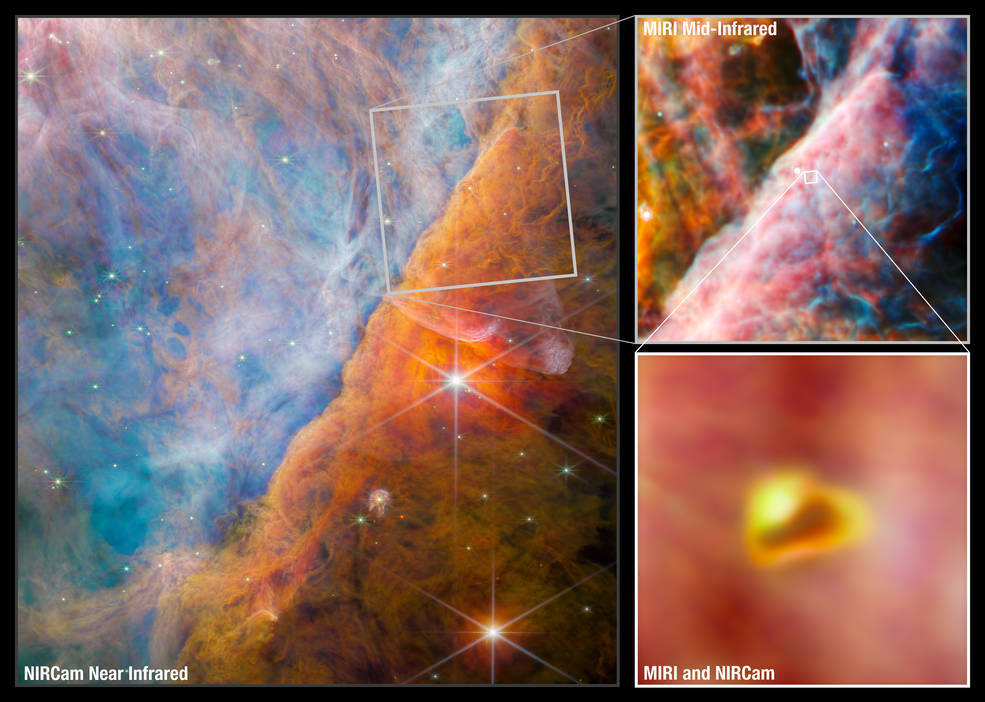
These Webb images show a part of the Orion Nebula known as the Orion Bar. The largest image, on the left, is from Webb’s NIRCam (Near-Infrared Camera) instrument. At upper right, the telescope is focused on a smaller area using Webb’s MIRI (Mid-Infrared Instrument). At the very center of the MIRI area is a young star system with a protoplanetary disk named d203-506. The pullout at the bottom right displays a combined NIRCam and MIRI image of this young system.
Credits: ESA/Webb, NASA, CSA, M. Zamani (ESA/Webb), and the PDRs4All ERS Team
The unique capabilities of Webb made it an ideal observatory to search for this crucial molecule. Webb’s exquisite spatial and spectral resolution, as well as its sensitivity, all contributed to the team’s success. In particular, Webb’s detection of a series of key emission lines from CH3+cemented the discovery.
“This detection not only validates the incredible sensitivity of Webb but also confirms the postulated central importance of CH3+ in interstellar chemistry,” said Marie-Aline Martin-Drumel of the University of Paris-Saclay in France, a member of the science team.While the star in d203-506 is a small red dwarf, the system is bombarded by strong ultraviolet (UV) light from nearby hot, young, massive stars. Scientists believe that most planet-forming disks go through a period of such intense UV radiation, since stars tend to form in groups that often include massive, UV-producing stars.
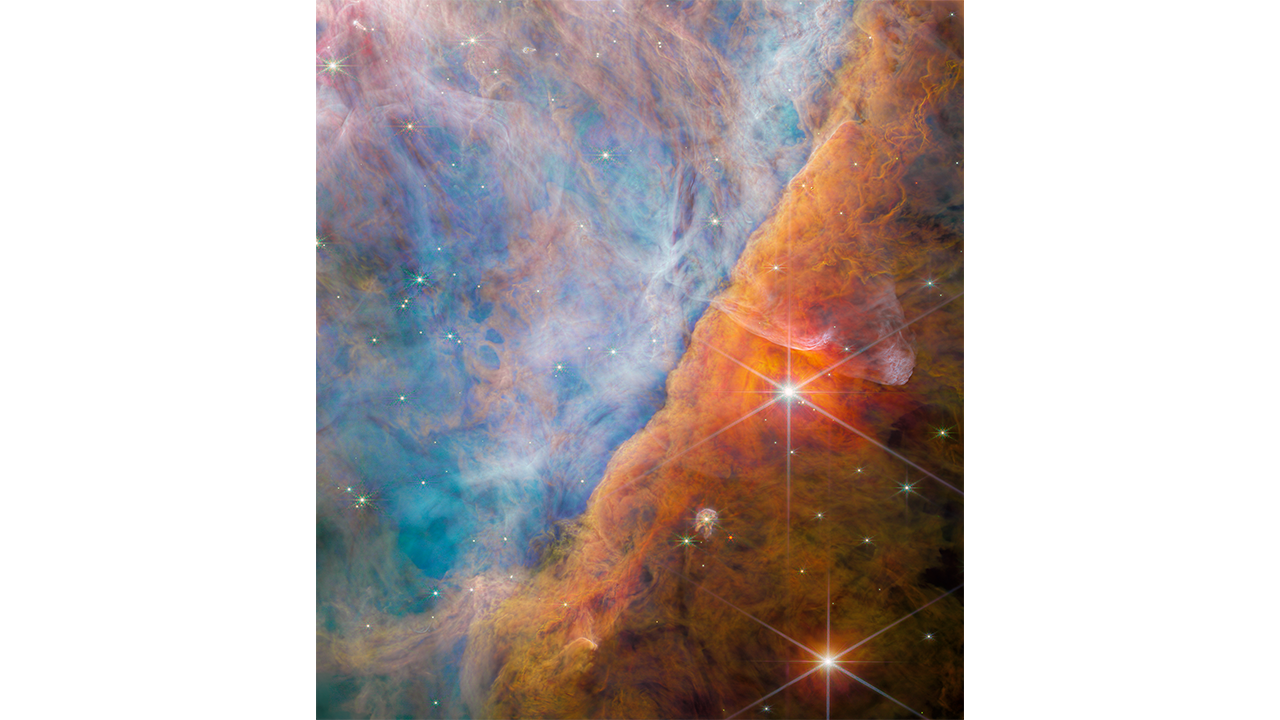
This image taken by Webb’s NIRCam (Near-Infrared Camera) shows a part of the Orion Nebula known as the Orion Bar. It is a region where energetic ultraviolet light from the Trapezium Cluster — located off the upper-left corner — interacts with dense molecular clouds. The energy of the stellar radiation is slowly eroding the Orion Bar, and this has a profound effect on the molecules and chemistry in the protoplanetary disks that have formed around newborn stars here.
Credits: ESA/Webb, NASA, CSA, M. Zamani (ESA/Webb), and the PDRs4All ERS Team
Typically, UV radiation is expected to destroy complex organic molecules, in which case the discovery of CH3+ might seem to be a surprise. However, the team predicts that UV radiation might actually provide the necessary source of energy for CH3+ to form in the first place. Once formed, it then promotes additional chemical reactions to build more complex carbon molecules.
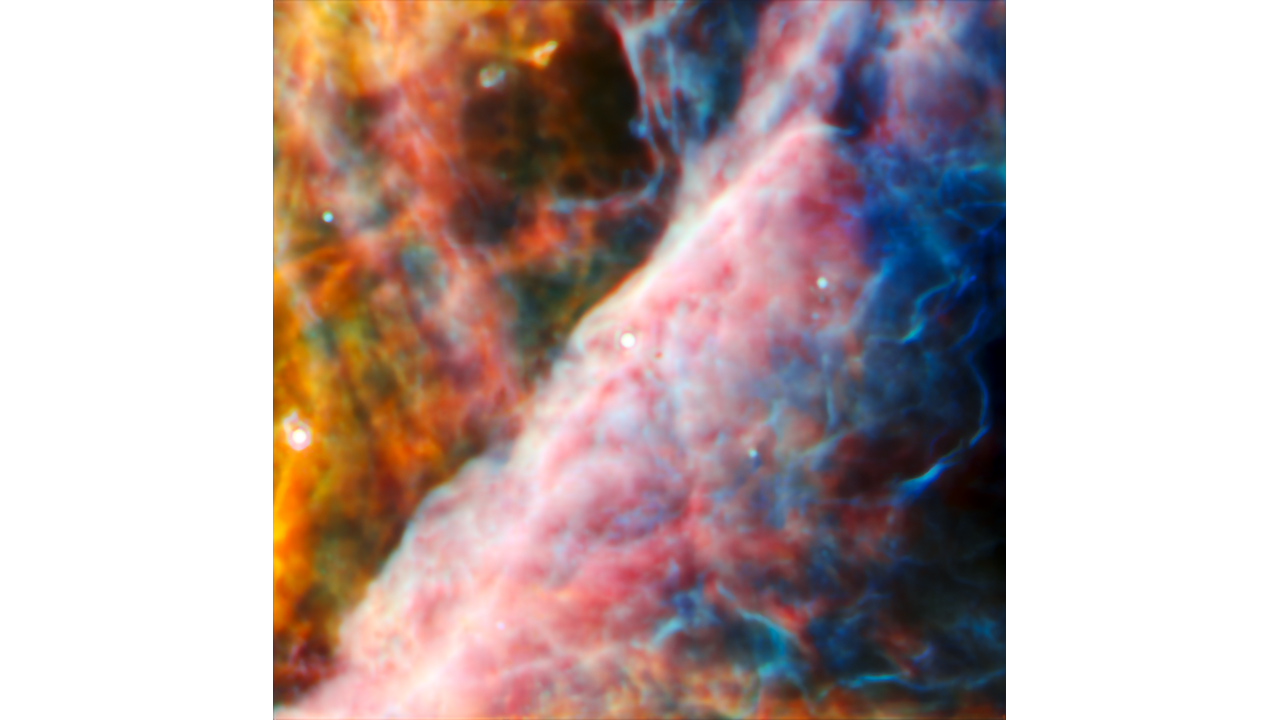
This image from Webb’s MIRI (Mid-Infrared Instrument) shows a small region of the Orion Nebula. At the center of this view is a young star system with a protoplanetary disk named d203-506. An international team of astronomers detected a new carbon molecule known as methyl cation for the first time in d203-506.
Credits: ESA/Webb, NASA, CSA, M. Zamani (ESA/Webb), and the PDRs4All ERS Team
Broadly, the team notes that the molecules they see in d203-506 are quite different from typical protoplanetary disks. In particular, they could not detect any signs of water.
“This clearly shows that ultraviolet radiation can completely change the chemistry of a protoplanetary disk. It might actually play a critical role in the early chemical stages of the origins of life,” elaborated Olivier Berné of the French National Centre for Scientific Research in Toulouse, lead author of the study.
These findings, which are from the PDRs4ALL Early Release Science program, have been published in the journal Nature.
Quelle: NASA
----
Update: 1.07.2023
.
NASA’s Webb Identifies the Earliest Strands of the Cosmic Web
Galaxies are not scattered randomly across the universe. They gather together not only into clusters, but into vast interconnected filamentary structures with gigantic barren voids in between. This “cosmic web” started out tenuous and became more distinct over time as gravity drew matter together.
Astronomers using NASA’s James Webb Space Telescope have discovered a thread-like arrangement of 10 galaxies that existed just 830 million years after the big bang. The 3 million light-year-long structure is anchored by a luminous quasar – a galaxy with an active, supermassive black hole at its core. The team believes the filament will eventually evolve into a massive cluster of galaxies, much like the well-known Coma Clusterin the nearby universe.
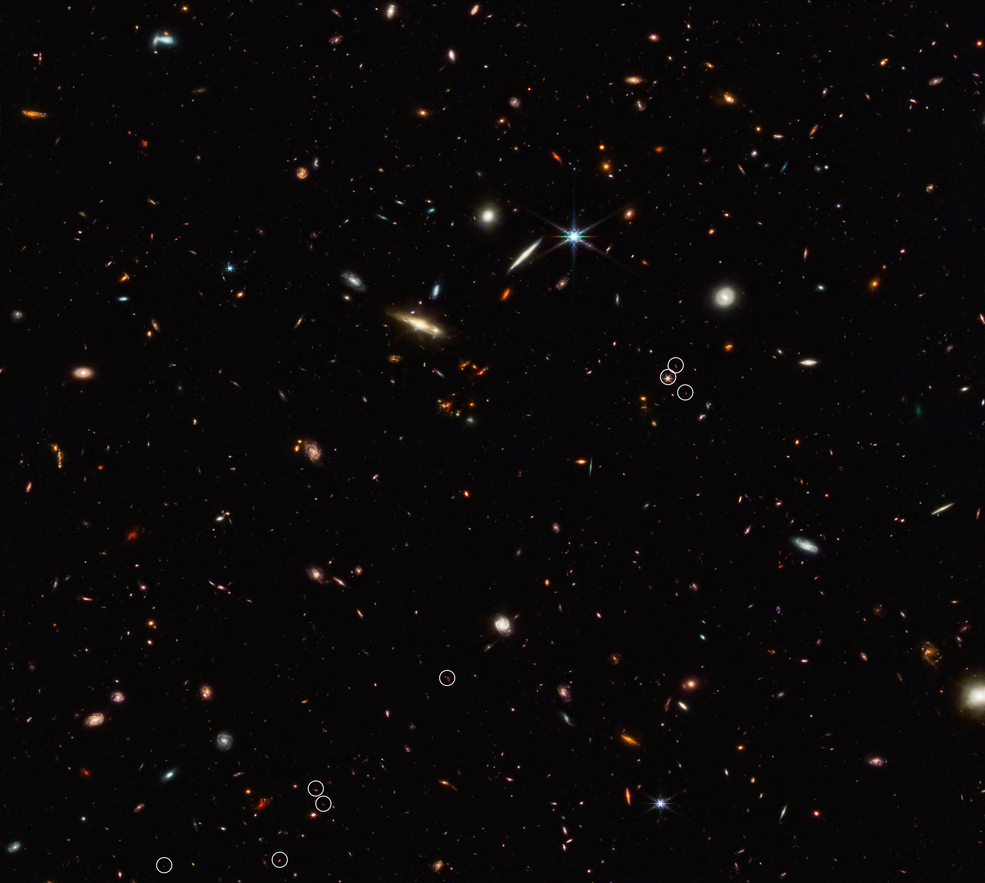
This deep galaxy field from Webb’s NIRCam (Near-Infrared Camera) shows an arrangement of 10 distant galaxies marked by eight white circles in a diagonal, thread-like line. (Two of the circles contain more than one galaxy.) This 3 million light-year-long filament is anchored by a very distant and luminous quasar – a galaxy with an active, supermassive black hole at its core. The quasar, called J0305-3150, appears in the middle of the cluster of three circles on the right side of the image. Its brightness outshines its host galaxy. The 10 marked galaxies existed just 830 million years after the big bang. The team believes the filament will eventually evolve into a massive cluster of galaxies.
Credits: NASA, ESA, CSA, Feige Wang (University of Arizona), and Joseph DePasquale (STScI)
“I was surprised by how long and how narrow this filament is,” said team member Xiaohui Fan of the University of Arizona in Tucson. “I expected to find something, but I didn't expect such a long, distinctly thin structure.”
“This is one of the earliest filamentary structures that people have ever found associated with a distant quasar,” added Feige Wang of the University of Arizona in Tucson, the principal investigator of this program.
This discovery is from the ASPIRE project (A SPectroscopic survey of biased halos In the Reionization Era), whose main goal is to study the cosmic environments of the earliest black holes. In total, the program will observe 25 quasars that existed within the first billion years after the big bang, a time known as the Epoch of Reionization.
“The last two decades of cosmology research have given us a robust understanding of how the cosmic web forms and evolves. ASPIRE aims to understand how to incorporate the emergence of the earliest massive black holes into our current story of the formation of cosmic structure,” explained team member Joseph Hennawi of the University of California, Santa Barbara.
This compass image shows a deep galaxy field imaged by Webb’s NIRCam (Near-Infrared Camera) for the ASPIRE program. The field includes a quasar, called J0305-3150, whose brightness outshines its host galaxy. At the bottom right are compass arrows indicating the orientation of the image on the sky. Below the image is a color key showing which NIRCam filters were used to create the image and which visible-light color is assigned to each filter.
Credits: NASA, ESA, CSA, Feige Wang (University of Arizona), and Joseph DePasquale (STScI)
Growing Monsters
Another part of the study investigates the properties of eight quasars in the young universe. The team confirmed that their central black holes, which existed less than a billion years after the big bang, range in mass from 600 million to 2 billion times the mass of our Sun. Astronomers continue seeking evidence to explain how these black holes could grow so large so fast.
“To form these supermassive black holes in such a short time, two criteria must be satisfied. First, you need to start growing from a massive ‘seed’ black hole. Second, even if this seed starts with a mass equivalent to a thousand Suns, it still needs to accrete a million times more matter at the maximum possible rate for its entire lifetime,” explained Wang.
“These unprecedented observations are providing important clues about how black holes are assembled. We have learned that these black holes are situated in massive young galaxies that provide the reservoir of fuel for their growth,” said Jinyi Yang of the University of Arizona, who is leading the study of black holes with ASPIRE.
Webb also provided the best evidence yet of how early supermassive black holes potentially regulate the formation of stars in their galaxies. While supermassive black holes accrete matter, they also can power tremendous outflows of material. These winds can extend far beyond the black hole itself, on a galactic scale, and can have a significant impact on the formation of stars.
“Strong winds from black holes can suppress the formation of stars in the host galaxy. Such winds have been observed in the nearby universe but have never been directly observed in the Epoch of Reionization,” said Yang. “The scale of the wind is related to the structure of the quasar. In the Webb observations, we are seeing that such winds existed in the early universe.”
These results were published in two papers in The Astrophysical Journal Letters on June 29.
The James Webb Space Telescope is the world's premier space science observatory. Webb will solve mysteries in our solar system, look beyond to distant worlds around other stars, and probe the mysterious structures and origins of our universe and our place in it. Webb is an international program led by NASA with its partners, ESA (European Space Agency), and CSA (Canadian Space Agency).
Quelle: NASA
----
Update: 2.07.2023
.
Saturn’s rings are glowing in Webb Space Telescope’s latest cosmic shot
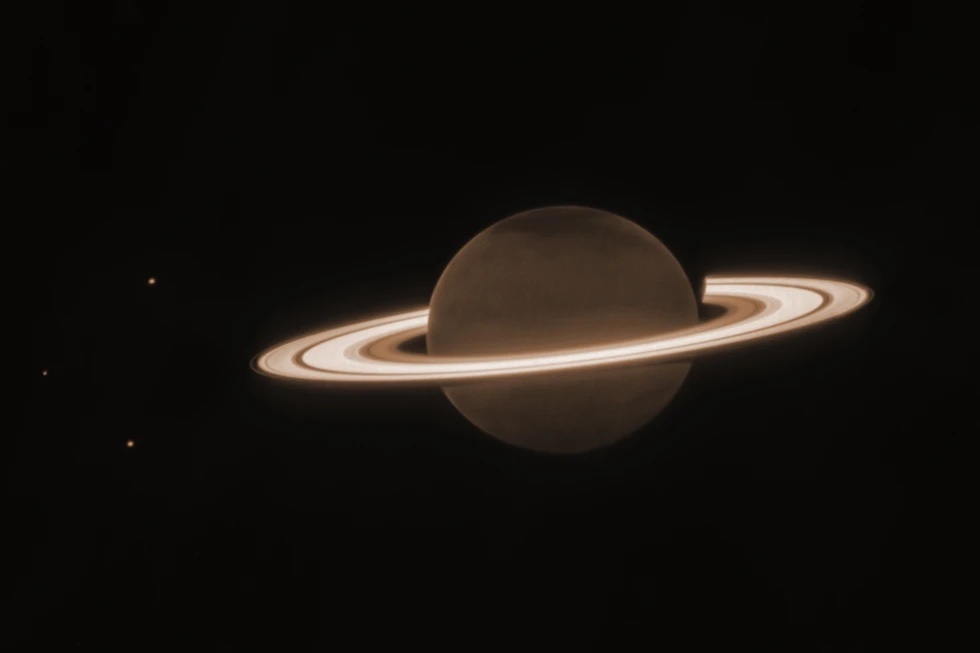
This June 2023 image provided by the Space Telescope Science Institute shows the planet Saturn and three of its moons, from left, Enceladus, Tethys and Dione, captured by the James Webb Space Telescope. In infrared, the planet appears dark because sunlight is absorbed by methane in the atmosphere. (NASA, ESA, CSA, JWST Saturn Team via AP)
Saturn has a fresh new look thanks to NASA’s Webb Space Telescope.
The gas giant is dark in the latest photo by Webb, released Friday, but its icy rings are glowing.
Webb snapped the picture in the infrared last weekend. At this wavelength, the planet appears dark because sunlight is absorbed by methane in the atmosphere. But the icy rings remain bright.
Three of Saturn’s many moons also got caught on camera.
Scientists are thrilled with this latest shot, which captures Saturn’s atmosphere in detail. They hope to uncover new ring structures as well as any new, faint moons that might be lurking there.
“We look forward to digging into the deep exposures to see what discoveries may await,” Matthew Tiscareno, a senior research scientist at the SETI Institute, said in a statement.
Quelle: AP
----
Update: 6.07.2023
.
James Webb Space Telescope spots the wreckage of a cosmic clash of the Titans (image)
A distant swirling galaxy imaged by the powerful space telescope may look serene but it has a violent past.
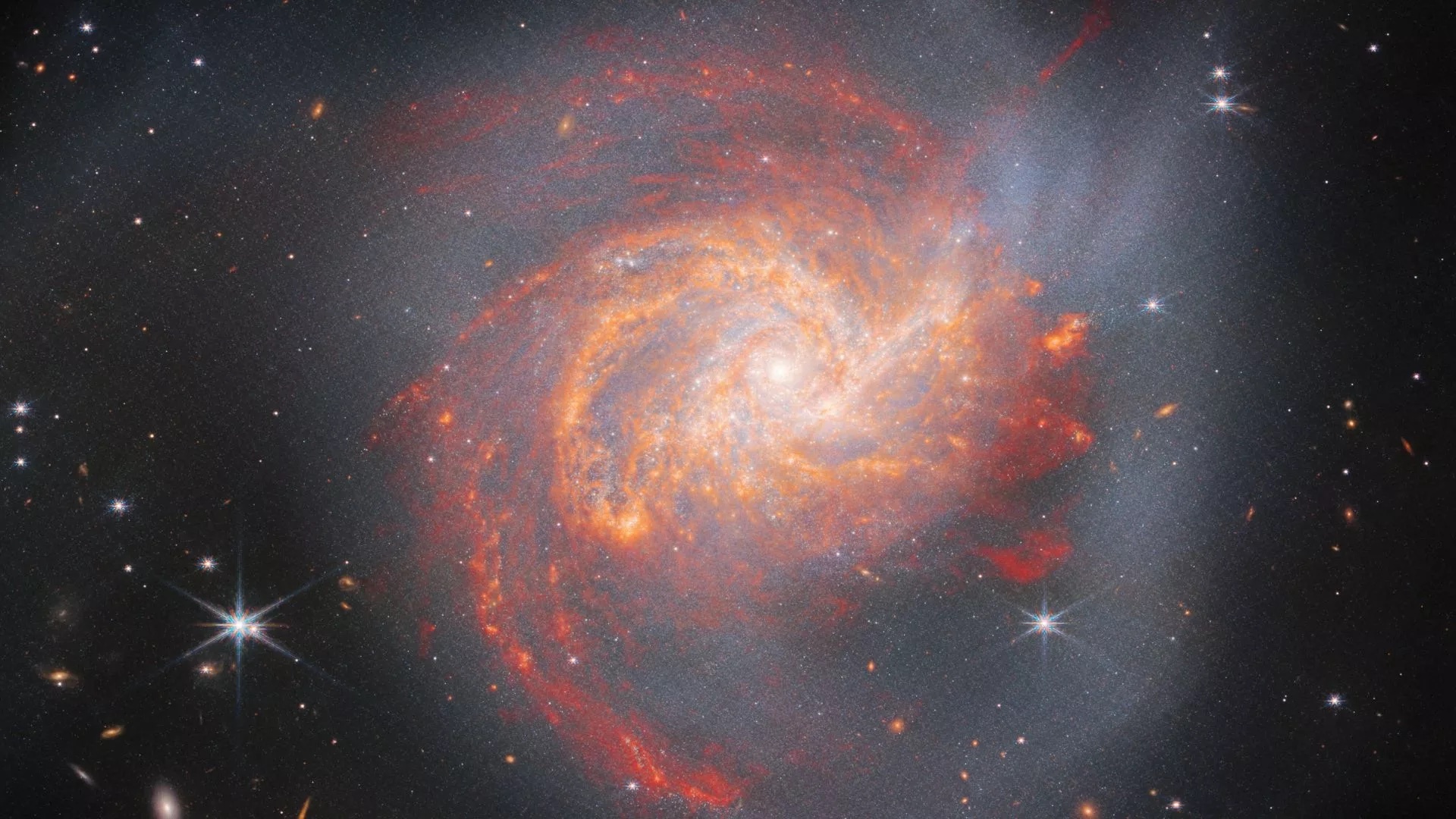
(Image credit: ESA/Webb, NASA & CSA, L. Armus, A. Evans)
A new image from the James Webb Space Telescope (JWST) shows that when it comes to galaxies, appearances can be deceiving.
The picture shows a serene-looking orange-red galaxy, but this cosmic spiral of gas, dust, and stars hides a violent past representing the wreckage of a massive collision between two earlier galaxies that proceeded around 500 million years ago.
The galaxy in question is NGC 3256, which lies around 120 million light-yearsfrom Earth and is a member of the Hydra-Centaurus Supercluster. Hints at the chaotic past of this swirl-like galaxy are hidden within the James Webb Space Telescope image in the form of long tendrils of shining dust and stars which extend outwards from the main body of the galaxy and the brightest portions of NGC 3256.
The study of these cosmic collisions can teach astronomers a great deal about how galaxies like our own, the Milky Way, grow by merging with other galaxies. As this galactic growth results in the merging and growth of black holes, studying wreckage like NGC 3256 could also help solve the mystery of how the supermassive black holes at the heart of most galaxies can grow to masses equivalent to millions or even billions of times that of the sun.
The historic merger that created NGC 3256 is also responsible for an intense burst of star formation in the galaxy. This happens because when galaxies collide, they channel gas and dust together into dense clouds to become the raw material needed for star birth.
The creation of young stars can be seen in the form of the brightest regions within the orange/red glow of NGC 3256. These stars are blasting out infrared light, irradiating tiny grains of dust that cause the galaxy to glow brightly and make it a perfect target for the JWST, which is designed to see the universe in infrared.
When galaxies collide, most stellar bodies escape the violent collisions unscathed, unlike the gas and dust content of those galaxies. That's because of large voids between stars. But it isn’t the case for all the stars in those galaxies. Visible in the JWST image of NGC 3256 are threads of stars that were wrenched free of their home galaxies as a result of gravitational interactions between the colliding galaxies giving rise to incredible tidal forces.
The stunning image of this galaxy was created by the JWST using data from its Near Infrared Camera (NIRCam) and its Mid-InfraRed Instrument (MIRI). Visualizing NGC 3256 in this way demonstrates the usefulness of the JWST, the most powerful telescope ever placed into orbit around Earth, in understanding the growth of galaxies and the evolution of the universe.
Quelle: SC

